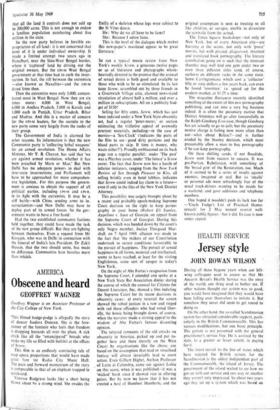Redder than red
INDIA KULDIP NAYAR
New Delhi—The 'bourgeois parliamentary sys- tem' or armed insurrection : this is the difficult choice facing India's communists. A breakaway
group has accused other communists of growing 'soft.' They have formed a third communist party, which christened itself Marxist-Lenini,t (cP141 & 1.) on May Day. It does not want to get involved in the mundane details of how or where to get money for the millennium
it promises. It believes that the parliamentary system must be scrapped to speed up progress,
and, in the words of its draft programme, 'today the basic task is to liberate the rural areas through armed agrarian revolution and encircle the cities and thus complete the revo-
lution throughout the country.' With proper deference to Chairman Mao, it goes on : 'We must reject the hoax of parliamentarianism and accomplish the people's democratic revolution through revolutionary people's war by uniting the fighting masses . . . on the firm basis of a worker-peasant alliance.'
The communists faced a similar challenge five years ago when several of them left the Communist party of India on the ground that it had grown effete. The new party called itself Marxist (cm-m) and openly commended the Chinese way of capturing power through revolt. People came to call the faction 'leftist' to distinguish it from the Communist party of India, which was referred to as 'rightist.'
The two factions, like the Stalinists and the Trotskyites, fought openly and bitterly, and contested the last general election in 1967 on separate platforms. The Marxists gained the upper hand and formed two state governments in Kerala in South India and in West Bengal after the voters had vainly tried the original Communist party for three general elections
since independence. But since then these governments have been finding out the hard facts of administration: that it is far easier to say that there should be more em- ployment and higher standards of living than to find funds to ensure them. Thetefore they have started saying that a communist society has to be built brick by brick.
Now both the established factions—`right. and 'left'—are worried : the right because it appears still further to the right; and the left because there is another group to challenge its extremism. And both realise that the third Com- munist party has a responsive atmosphere to exploit. In India the landless number about 100 million. Even minimum land reforms have taken long to implement, and the Central Planning Commission has itself blamed the government for being too slow. On the other hand, there is very little land for the govern- ment to distribute. The left-faction land ad- ministration in West Bengal has itself found that all the land it controls does not add up to 300,000 acres. This is not enough to endow a landless population numbering about five million in the state.
So the new party believes in forcible ex- propriation of all land: it is not concerned that most of it is under individual ownership. It made a limited attempt two years ago in Naxalbari, near the Sino-West Bengal border, where it 'captured' land by driving out the original owners. But the CPL-M West Bengal government at that time had to curb the insur- rection. In fact, the rift between the extremists —also known as Naxalites—and the CPI-M dated from then.
Then the extremists were only 3,000, concen- trated most in West Bengal. Now they are six times more: 4,000 in West Bengal, 6,000 in Andhra Pradesh, 5,000 in Kerala and 1,000 each in Punjab, Uttar Pradesh, Bihar and Madras. And this is a matter of concern for the CPI-st leaders, for the recruits to the new party come very largely from the ranks of their group.
The Government of India is alarmed for other reasons. Its information is that the new Communist party is 'collecting lethal weapons' for an armed revolution. The Home Affairs Minister, Mr Y. B. Chavan, has said that 'we are against armed revolution, whether it has been preached by Marx or Mao.' But New Delhi has no adequate powers to deal with inter-state insurrections, and Parliament will have to be approached for more comprehen- sive legislation.. For this purpose the govern- ment is anxious to obtain the support- of all. political parties, including CP1-M and CPI-R, in its fight with the extremists. It may be a stiff battle—with China sending arms to in- surrectionists—and New Delhi may have to deploy part of its armed forces. So the gov- ernment wants to have a free handr Had the two established communist factions held together, they could have made the task of the new group difficult. But they are fighting between themselves. Even a request from Mr Kosygin, who was in Delhi in connection with the funeral of India's late President, Dr Zakir Husain, that the two should unite, has made no difference. Communists bate heretics more than infidels.



































 Previous page
Previous page